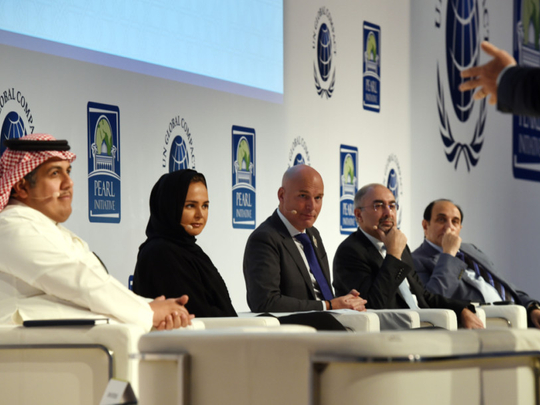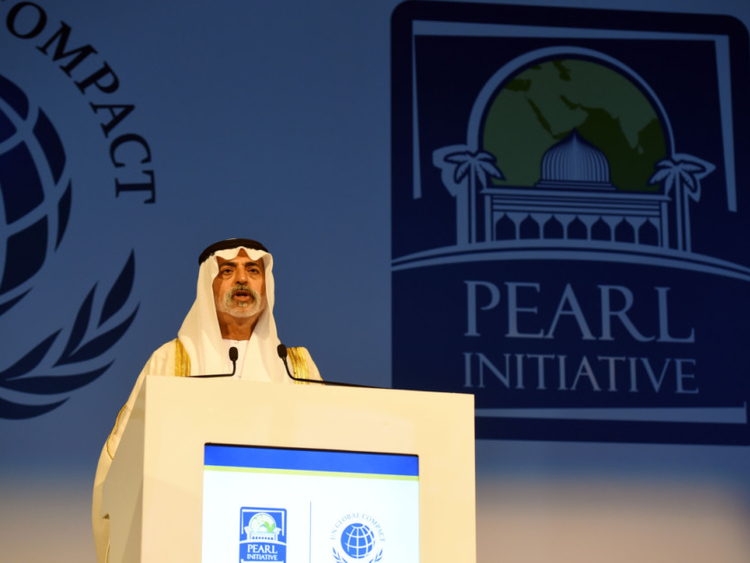
DUBAI: As multinational corporations trim costs by long-term investment sustainability, smaller firms struggle to apply the same principles, experts told delegates at the second Pearl Initiative and UN Global Compact Regional Forum.
While Sanjeev Chadha, PepsiCo’s CEO for Asia, the Middle East and North Africa, extolled the virtues of water reduction and other sustainable measures that he later said had saved PepsiCo $600 million in operating costs over the last 10 years, Patrick Chalhoub, CEO of Chalhoub Group, and Professor Christoph Loch, director of the Cambridge Judge Business School, said smaller firms lacked resources to invest in sustainability and found themselves at a competitive disadvantage against competitors if they did.
The lively panel discussions at the forum, held at the Conrad Hotel, Dubai, on Thursday, brought into focus several debates around business sustainability — whether regulation is necessary or whether the market, through the requirements of investors and lenders, is sufficient; whether short-term interests act against investment in sustainability; the role of corporate social responsibility; and whether business is properly serving the needs of its employees and society.
Shaikh Nahyan Bin Mubarak Al Nahyan, UAE Minister of Culture and Knowledge Development, summed up the core philosophy in his opening address: “Supporting sustainability is good for business.”
Shaikh Nahyan pointed out that the banning of hydrofluorocarbons (HFCs), compounds widely used as refrigerants that contribute to global warming, allowed Honeywell, which had invested in developing a less harmful alternative, a chance to sell its product. Shaikh Nahyan said Honeywell’s hydrofluoroolefins (HFOs) would save the CO2 equivalent of keeping 100 million cars off the road for a year by 2025.
Speaking of the 17 sustainable development goals (SDGs) adopted unanimously by the UN in September, Shaikh Nahyan said, “The targets ... implicitly challenge governments to be the very models of sustainability. Governments that do not meet that challenge will never persuade their citizens or their commercial communities to embrace sustainability.
“And we must remember that large elements of the private sector must in fact be persuaded. That is tricky business, and both the Pearl Initiative and the UN Global Compact recognise the complexity of the relationship between corporate responsibility and corporate profits.”
Nevertheless, he pointed out that 143 organisations in the UAE, including companies, business associations, small and medium enterprises (SMEs), NGOs and educational establishments, were already participating in the UN Global Compact.
That achievement was acknowledged by UN Secretary General Ban Ki-moon in a video address to the forum. “The UAE shows fine examples of companies investing in renewable energy. The UN Global Compact is making the sustainable development goals more local for a network of businesses. The Pearl Initiative is expanding good corporate governance across the Gulf region. This is increasingly important now that the international community has agreed on a common cause toward a sustainable future.
“The private sector is crucial to realising the 2030 agenda for sustainable development. More and more corporate leaders understand that sustainable development is not just the right way forward, it also serves the long-term interests of businesses and stakeholders by improving stability and prosperity.”
Shaikha Hanadi Al Thani, founder and chairwoman of Qatar’s Amwal, speaking in a panel on achieving shared prosperity, reminded delegates that the well-being of individuals, not GDP growth, was the goal.
“When I started looking at the [sustainable development] goals, these are challenges that we face in every company,” she said. “And maybe, in this period of chaos, some challenges are more important than others. For us, within the Gulf, it’s the employment of youth, the ignition of the SMEs and innovation, it’s gender equality, it’s fair pay.
“These are things that I can tackle in my own business.”
Speaking after his appearance on the prosperity panel, PepsiCo’s Chadha offered his thoughts on how SMEs could be encouraged to adopt sustainable practices.
One method, he said, was for multinationals to lend their expertise to extend sustainability to their local partners and suppliers.
Another? “Honestly, forums like this play an important role. As a small company you can do a lot, and ... it would be beneficial commercially to do it. It’s just that sometimes you haven’t really convinced yourself about it, are not aware of it. If you see a best practice has been done, you say, ‘Wow, I can go into this myself was well.’
“That exchange is required, and it has to happen on two levels. One is forums like this — I really appreciate the Pearl Initiative in this. The second, honestly, is governments. The governments to create a more structured platform where you have a much greater and ongoing process of sharing best practices. I firmly believe in partnerships.”











